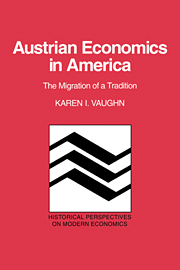Book contents
- Frontmatter
- Contents
- Preface
- Acknowledgments
- 1 Introduction
- 2 Carl Menger and the foundations of Austrian economics
- 3 Economic calculation and the rediscovery of Mengerian themes
- 4 Ludwig von Mises: Austrian economics in America
- 5 The Austrian revival
- 6 Defining the Austrian paradigm
- 7 Market process: the problem of order in Austrian economics
- 8 Austrian economics: which way forward?
- References
- Index
4 - Ludwig von Mises: Austrian economics in America
Published online by Cambridge University Press: 06 October 2009
- Frontmatter
- Contents
- Preface
- Acknowledgments
- 1 Introduction
- 2 Carl Menger and the foundations of Austrian economics
- 3 Economic calculation and the rediscovery of Mengerian themes
- 4 Ludwig von Mises: Austrian economics in America
- 5 The Austrian revival
- 6 Defining the Austrian paradigm
- 7 Market process: the problem of order in Austrian economics
- 8 Austrian economics: which way forward?
- References
- Index
Summary
Although it was Friedrich Hayek who brought Austrian economic ideas to England, it was his older colleague and mentor, Ludwig von Mises who is most identified with Austrian economics in America. This is not to say that Mises was the first Austrian economist to emigrate to the United States. Indeed, Mises was the last who can be said to have been pushed out of his native country by the advance of Hitler's armies during the interwar period. Preceding Mises had been such eminent figures as Joseph Schumpeter, Gottfried Haberler, Fritz Machlup, and Oscar Morgenstern, all of whom obtained good academic appointments in major American universities and assimilated themselves nicely into the indigenous academic scene. Mises, on the other hand, arrived in the United States in 1940, never acquired a tenured academic appointment, never fully assimilated into the contemporary academic milieu, and ended up becoming the controversial symbol of Austrian economics in America. It also turned out, undoubtedly because of his professional isolation from the mainstream academic community, that Mises' ideas became the focal point for the Austrian revival of the 1970s.
As we have already noted, Mises was one of the younger generation of Austrian economists who studied under Bohm-Bawerk and Wieser at the University of Vienna in the opening years of the twentieth century. Mises received his law degree in 1906, and after a brief stint as a law clerk, he accepted a position at the Vienna Chamber of Commerce in 1909 (Mises, 1978:71).
- Type
- Chapter
- Information
- Austrian Economics in AmericaThe Migration of a Tradition, pp. 62 - 91Publisher: Cambridge University PressPrint publication year: 1994

